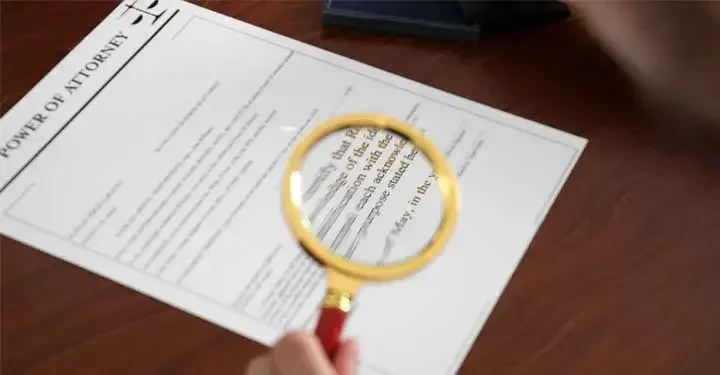Assigning someone power of attorney is an important part of the estate planning process. But situations and relationships change. It's a good idea to review your financial and healthcare powers of attorney every year to ensure that they still reflect your wishes.
But what do you do if you’ve changed your mind? How do you take power of attorney away from someone—and give it to someone else? Can a family member revoke a power of attorney? If you have questions about changing this legal document, we’re here to help.

How to revoke power of attorney in 5 steps
The person you’ve given power of attorney is called your agent or your “attorney in fact.” As the person giving over the power, you are known as the “principal.” Before you name a new agent, be sure they’re willing to fill this important role so you can rest assured that if your power of attorney is ever needed, you'll be in good hands. Then, changing your durable power of attorney (durable POA) is a simple and affordable process.
Step 1: Prepare a written revocation letter
A revocation document or letter is the most common method to cancel a power of attorney. This is a legal document that should clearly state that the power of attorney is no longer valid. Be sure to include the original date of the power of attorney, your legal name, the legal name of the agent, and state that the agent no longer holds any legal authority.
Step 2: Notarize the letter
Sign the revocation letter in front of a notary public to verify its authenticity and make sure it holds up in court. The notary’s seal confirms that the document is genuine and that the signature belongs to you. While it’s not always required, notarizing the revocation can prevent future disputes about who has authority over your affairs. Be sure to check your state’s laws to see if there are any additional signing requirements for a revocation of power of attorney.
Step 3: Distribute the revocation notice
After you sign the letter, provide copies to the agent and any other parties who were aware of the original power of attorney, like financial institutions, healthcare providers, or legal representatives. Sending a written notice informs all involved parties that the agent no longer has the authority to act on your behalf. Make sure each party confirms receipt.
Step 4: Destroy existing copies
If you never gave anyone a copy of your power of attorney and never told your agent about it, you can typically just shred it and throw it away, then delete any digital copies. Eliminating all copies of the original power of attorney prevents confusion and unauthorized use of the outdated version.
Step 5: Create a new power of attorney (if desired)
If you need to appoint a new agent, you can transfer power of attorney to someone else by signing a new power of attorney. When a new power of attorney is created, the previous one is usually automatically revoked, providing legal clarity moving forward. This allows you to assign a new agent and update their authority and responsibilities. The new document should follow your state’s legal requirements.
5 reasons to revoke a power of attorney
Your power of attorney isn’t set in stone; you can revoke it at any time, and you don’t need to give a reason. Still, there are certain circumstances in which your power of attorney may be no longer suitable. If any of these apply to you, it’s time to rethink things and research how to revoke power of attorney.
1. Relationship changes
Chances are, your power of attorney appoints a relative or close friend to act as your agent. But your relationship may be very different now than it was when you signed your power of attorney. People get divorced, they grow apart, and they have disagreements that can’t be resolved. Your agent should be someone you can trust to act in your best interest. If you no longer trust the person you originally chose to make health, money, or legal decisions on your behalf, you can revoke the old power of attorney and sign a new one.
What about family members? Can a family member revoke a power of attorney on your behalf? If you’re mentally competent, family members can’t revoke your power of attorney. However, if you become incapacitated and they believe your attorney in fact isn’t acting in your best interest, they can challenge it in court.
2. Death or incapacity
Power of attorney is for when you can no longer make your own decisions, so the person you appoint as attorney in fact must be alive and have the mental capacity to act on your behalf. As a practical matter, this means the person you’ve named should be able to manage finances, make decisions, and understand the consequences of those decisions.
Dementia, mental or physical illness, substance abuse, and accidents are just some of the things that can affect a person’s mental capacity. If you don’t think the person you originally chose can handle this authority anymore, or if your agent dies or becomes ill, it's time to revoke your old power of attorney.
3. Availability concerns
Consider whether your agent is truly available to step into the role if needed. For example, it may be important to have an agent who lives in the same city or state as you so they can be available for health issues or to handle personal business. If your agent has moved overseas, it may be time to appoint a new power of attorney. Similarly, you might not want an agent who travels often or has a job that would make it difficult to handle the job of power of attorney.
4. Your agent asks you to
Sometimes, the person you’ve appointed decides they don’t want to be your agent anymore. You don’t want someone managing your affairs or making legal or medical decisions on your behalf if they don’t want to do it. The best course of action is to honor their request and revoke the old power of attorney.
You can also prepare for this situation in case it happens while you’re incapacitated by appointing a successor agent, which is someone who is “second in line” to act as your power of attorney. If you don’t, the court may need to appoint a new person.
5. You change your mind
You don’t have to provide a reason for starting the revocation process. That means you can cancel your current power of attorney simply because you’ve had second thoughts about the person you appointed as agent. Perhaps the person appointed turns out not to be great with money. Or you may decide you don’t need a power of attorney. A power of attorney gives someone broad authority to act on your behalf, and it should reflect your wishes with no questions asked.
Do you need a lawyer to revoke power of attorney?
No, you don’t need a lawyer. By reading this article, you’ve already started learning how to revoke power of attorney on your own. However, advice from a lawyer or even a financial advisor can be helpful if your situation involves disputes, complex financial or healthcare matters, or a large estate. Some states also have specific requirements, so it’s smart to consult an attorney to make sure you’re following them correctly.
FAQs
Can a power of attorney be revoked at any time?
Yes, a power of attorney can be revoked at any time, provided the principal is mentally competent. If the principal is mentally incapacitated, they cannot revoke the power of attorney themselves. A court might need to intervene, especially in cases that require adult protective services, by appointing a new guardian or conservator to handle the revocation process.
How much does it cost to revoke power of attorney?
Revoking a power of attorney is generally free. However, if you choose to hire a lawyer to assist with the revocation process, legal fees could apply. Notarization fees might also be involved. In most cases, the total cost is relatively low unless you need a lot of legal help for a complicated case.
How long does it take to revoke a power of attorney?
The revocation process can be completed quickly once you sign the revocation letter and provide copies to third parties. In that case, the power of attorney can be legally revoked within a day. The time it takes for third parties (such as banks or medical providers) to update their records can vary, taking anywhere from 24 hours to a few business days.
Who can override a power of attorney?
A court can override a power of attorney if the agent is abusing their authority or not acting in the principal’s best interests. Family members can also challenge the power of attorney and the agent’s authority in court if they suspect misuse of power. In these cases, the court may appoint a legal guardian to protect the principal’s rights.
Jane Haskins, Esq. contributed to this article.


